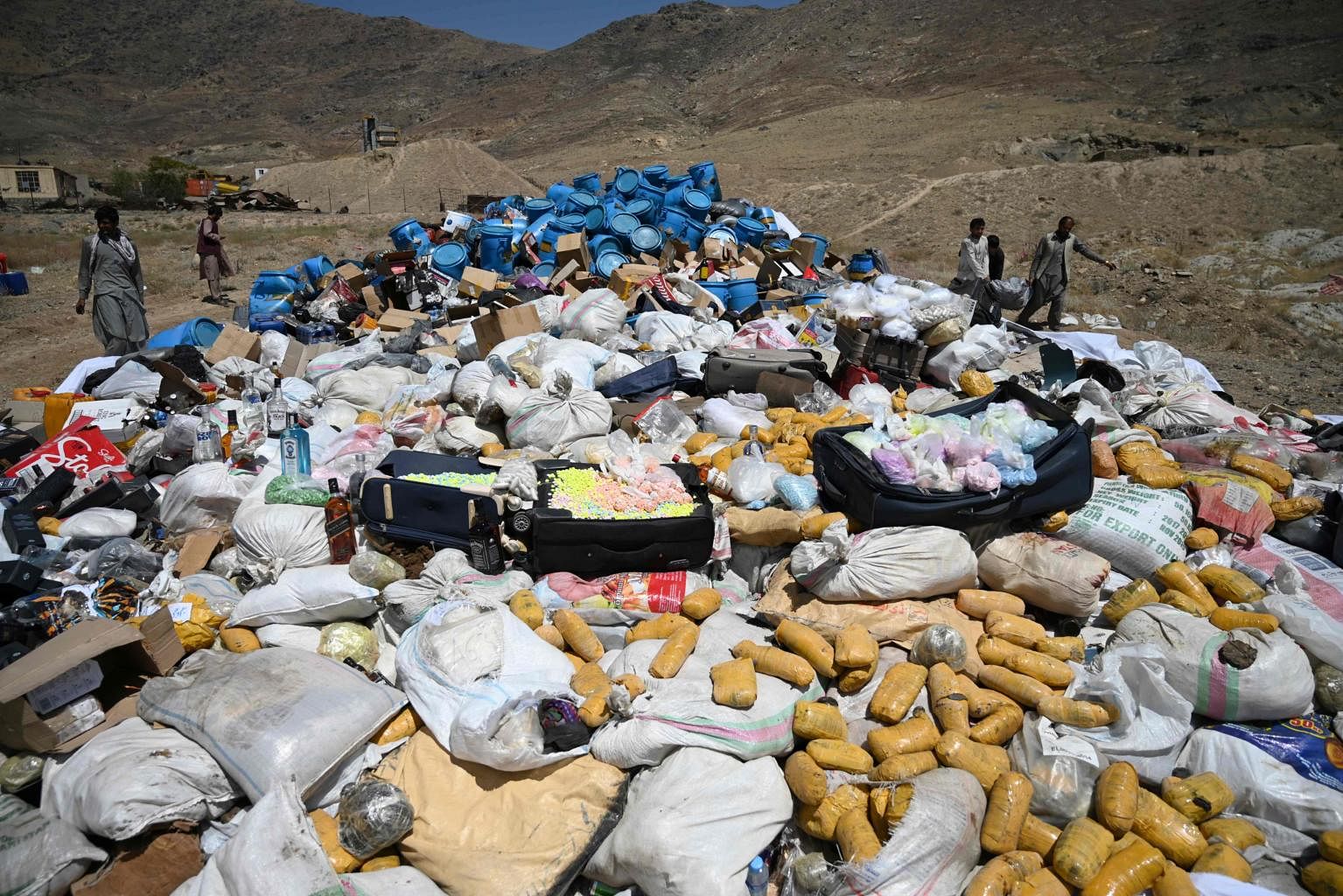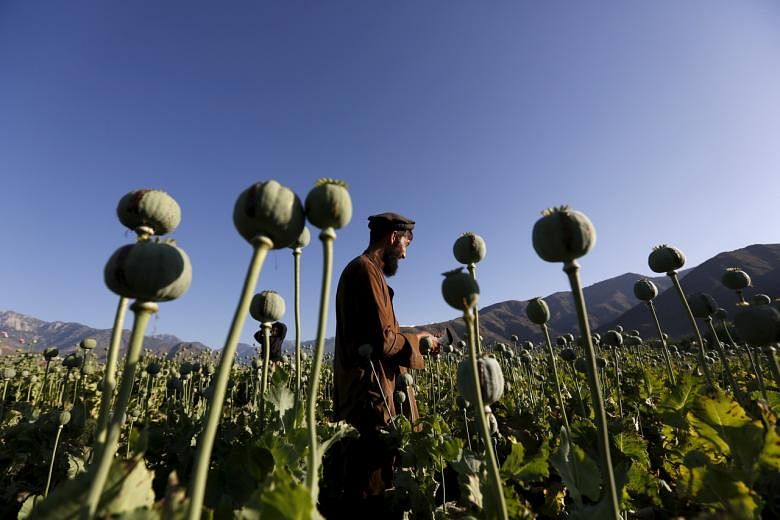NEW DELHI - India's seizure of 3,004kg of heroin, said to be the biggest haul in recent years, and the arrest of four Afghan nationals have put the spotlight on the illicit drug trade out of Afghanistan.
Experts expect the drug trade to continue its upward trend under the new Taliban regime, with India being the final destination as well as transit point to Europe and North America.
In the case on Sept 13, anti-smuggling agency Directorate of Revenue Intelligence (DRI) discovered the heroin stashed in bags topped off with talc stones, used in the manufacturing of paper and cosmetics, in two containers that arrived at Mundra Port in Gujarat state from Bandar Abbas in Iran.
The shipment originated from Kandahar, Afghanistan, and is estimated to be worth around 35 billion rupees (S$642 million).
Eight people - including four Afghans and one Uzbek national - have been arrested as investigations continue in half a dozen Indian cities, including Delhi and Chennai, the DRI said in a statement.
According to officials, the size of the shipment was unusual.
"It is such a risk to transport such a large amount. Normally, it is smuggled in smaller quantities," said a customs official, who did not want to be named.
He listed the change of government in Afghanistan as one potential reason for the size of the shipment, or someone desperately trying to get the drugs out of Afghanistan.
"This requires a detailed investigation. This is a challenge for the world community," he added.
Afghanistan is the world's largest opium producer, accounting for 80 per cent of the worldwide supply, said the United Nations Office on Drugs and Crime (UNODC). Opium is refined to manufacture drugs like heroin.
The total area under opium poppy cultivation in Afghanistan went up by 37 per cent from 2019 to 224,000ha in 2020, according to the Afghanistan Opium Survey 2020.
Opium poppy cultivation in Afghanistan grew "due to political instability, scarce employment opportunities, lack of quality education and limited access to markets", according to the UNODC.

Experts said that since none of these factors had changed under the Taliban regime, the likelihood of this trade continuing and growing remained high
"These factors are not going to go away in foreseeable future and, therefore, will continue to be the reason for unabated production of opiates and their trans-border smuggling to different parts of the world," said Mr Devendra Dutt, a former Indian Narcotics Control Bureau official who has also served with the UNODC regional office for South Asia.
The Taliban rulers have maintained that they will stop the cultivation and smuggling of opiates, but are yet to make a move on the ground.
In 2000, during its first stint in power, the Taliban banned poppy growing but changed tack amid domestic backlash from cultivators.
The country, blocked from funds and aid because of the Taliban takeover, is currently in dire financial condition.
According to the UNODC, the overall income generated by domestic consumption, production and exports of opiates in Afghanistan was estimated at between US$1.2 billion and US$2.1 billion (between S$1.6 billion and S$2.8 billion) in 2019.
"The common understanding is that the Taliban might bring more areas under poppy cultivation to generate revenue even though it runs contrary to their beliefs... However, we also know that decades-long anti-narcotics programmes have failed in Afghanistan, making it one of the largest producers of opium," said Dr Pushpita Das, research fellow and centre coordinator (internal security) of the Manohar Parrikar Institute for Defence Studies and Analyses.
"Change in the political dispensation in Afghanistan might result in a spike as far as production and distribution of narcotics are concerned. But to what extent is a matter of conjecture. On our part, we need to remain ever vigilant and strengthen our intelligence and interception capabilities regarding drug trafficking in the country," he added.
Illegal drugs make their way into India from Afghanistan either by sea or by road through Pakistan and into the Indian state of Punjab. While drugs are distributed within the country, India is also a transit point for drugs to the West.
According to the Report of the International Narcotics Control Board for 2018, illicitly produced opiates, in particular heroin, from Afghanistan are sent to Europe and North America, mainly Canada.
This, the report says, is done via the "alternate" southern route that bypasses the Gulf countries and uses South Asia as a stopover for opiates.
Officials said that activity on the sea route had also increased recently.
On Sunday (Sept 19), 50kg of heroin worth 2 billion rupees originating from Afghanistan was seized off the coast in Gujarat state and seven Iranians were arrested.
"Between 2017 and 2020, most of the Afghan opiates were transported by road. The trend is changing as sea route is being used now to smuggle out large quantities," said Mr Dutt.
He said that India, given its large number of minor and major ports, airports and more than 3,000km-long international border with Pakistan, is "susceptible to transnational organised smuggling of drugs".
He added that given the situation in Afghanistan, "it would be reasonable to conclude that the upward trend in production and trafficking of Afghan opiates will continue under the new 'government' of Afghanistan".
The US-based East-West Center will host a webinar, "The New Geopolitics of Afghanistan", on Wednesday (Sept 29), 10am Singapore time, moderated by ST's US bureau chief Nirmal Ghosh. Do sign up at this website.


